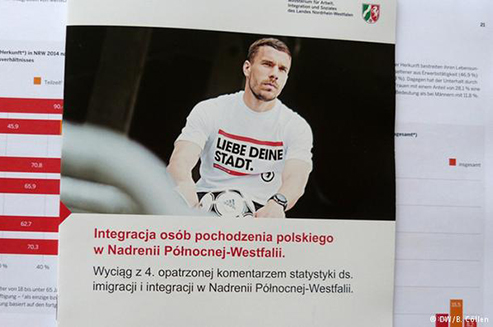The integration of people of Polish origin in North Rhine-Westphalia is a “story of true success” – claims State Secretary for Integration in the Ministry of Labour, Integration and Social Affairs, Torsten Klute (SPD).
In North Rhine-Westphalia there is the biggest number of people of Polish origin in Germany. Poles are also the largest group among all the migrants living in this land.
Exceptionally well integrated
– The level of integration between people of Polish origin and those from our land is exceptional – estimates Torsten Klute in his interview for Deutsche Welle.
The State Secretary for Integration in the North Rhine-Westphalia’s government emphasises a high level of education and qualifications among people of Polish origin, both those who came from Poland as well as those who were born in Germany. – We can see that these people are also active in their professional life and rarely collect social benefits – stresses Torsten Klute.
The surveys on the integration level among people of Polish origin are very representative. They were based on the statistical data collected in North Rhine-Westphalia in 2014, which includes the data of 564 000 people of Polish origin (48.6% of men and 51.4% of women). The authors of the report emphasise that “people of Polish origin are not only Polish citizens but also those who received German citizenship, came to North Rhine-Westphalia as displaced persons and those whose one parent was born in Poland.”
Education and qualifications structure
Compared to all the migrants living in North Rhine-Westphalia, people of Polish origin are better educated. Only 3.9% of them do not have any school diploma (13.7% among other migrant groups), approx. 37% have basic education (33.3% among other migrant groups) and 37.8% have a high-school certificate or vocational education (31.5% among other migrant groups).
It is worth noting a large number of high-school certificates among people of Polish origin who were born in Germany (49.9%). Much more often it is women who have it (43.5 %) than men (31.7%). As far as vocational education is concerned, more than half (56.7%) of people of Polish origin have it (60.7% of men and 53% of women). To compare: among all migrant groups there are 38.6% of people with vocational education.
High professional activity
In 2014 the number of professionally active people of Polish origin between 15 and 65 years old in North Rhine-Westphalia was approx. 71% (approx. 60% among all other migrants). The unemployment rate in the same age group was 7% (9.5% among all other migrants).
The highest employment rate – approx. 81% – is reported among people of Polish origin who came to Germany between 1950 and 1989. After 1989 the professionally active people rate was around 69% (approx. 65% with Polish citizenship and approx. 72% with German citizenship).
There are 9% of people of Polish origin who run their own business. This rate is higher among people with Polish (19%) than with German citizenship (over 6%).
Intellectual work is mainly done by women of Polish origin – 67% (approx. 37% of men). Therefore, the rate of women connected with manual work is lower (26% compared to 49% among men).
People of Polish origin often have a full-time job (70% compared to 72% among all migrant groups). Among those there are more people with the German (70.3 %) than with the Polish citizenship (approx. 63%). There are also more men of Polish origin having a full-time job (approx. 91%) than women (approx. 46%).
State Secretary for Integration in North Rhine-Westphalia regrets that people of Polish origin “have jobs that don’t match their qualifications too often.” – On the one hand, it’s normal when someone comes to another country. At the beginning people usually take any job. But it’s much better for the integration process to work in one’s profession – believes Torsten Klute. He claims that people who emigrate from Poland to North Rhine-Westphalia “should visit employment consulting centres more often.”
Earning a living
The main source of living for people of Polish origin in North Rhine-Westphalia is a full-time job (approx. 56 % compared to over 46 % in other migrant groups).
Social benefits are collected by over 10% of people of Polish origin. This is 5% less than in other migrant groups.
Fewer people of Polish origin (over 20 %) rely on their relatives’ help than other migrants (over 25%).
In 2014 an average net income among people of Polish origin in North Rhine-Westphalia was 1,399 EUR (Polish citizenship) and 1,734 EUR (German citizenship).
In North Rhine-Westphalia the biggest group of migrants are people of Polish origin between 30 and 50 years old (39.9 %). People below 30 years old constitute 36.4%, while above 55 years old – 25.3%.
The change in the perception of Polish people in Germany
The Ministry of Labour, Integration and Social Affairs was induced to examine the integration level among people of Polish origin living in North Rhine-Westphalia by the 25th anniversary of signing the Polish-German Treaty of Good Neighbourship.
Torsten Klute says that it is hard to believe how much the perception of Poland and Polish people has changed compared to the beginning of the 1990s, when so-called Polish jokes were omnipresent. – No one tells such jokes any more – he says. In his opinion it is the true success of the Polish-German relations in the last 25 years. – We have to try to keep it this way as it is not something obvious. We have to work hard by supporting good Polish-German affairs on the land level as well as in the bilateral relations between Poland and Germany.
Author: Barbara Cöllen
Photo © Barbara Cöllen /DW
Source: Deutsche Welle



